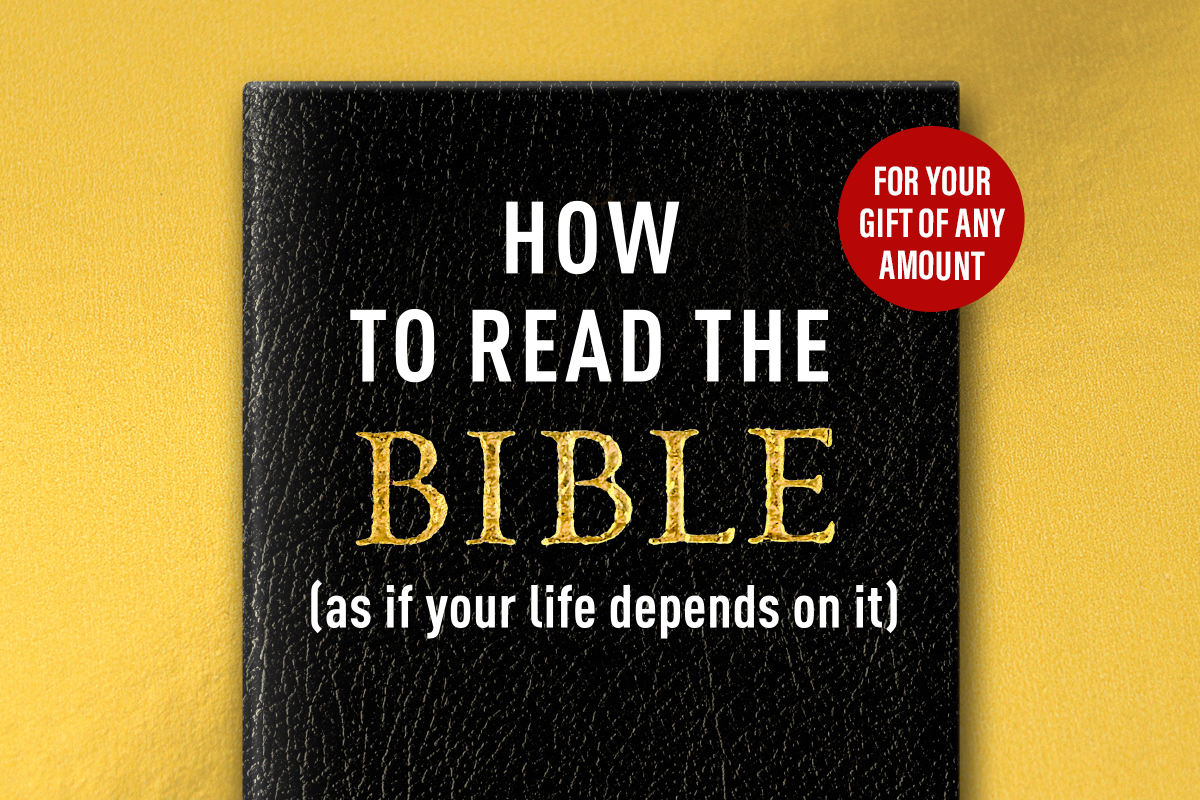
A CAPTIVATING CRASH COURSE ON SCRIPTURE
As Biblical illiteracy increases in our midst and fewer Christians are reading the Bible daily, misunderstanding of God’s Word and the wonder of His revelation to us is rampant. In his NEW book, Dr. Michael Youssef offers you a fresh appreciation of the Bible, helping you read it for understanding—whether you are a skeptic, new in your faith, or have been walking with Christ for decades.
PART II: THE KINGDOM AND THE COVENANT
The themes of the Kingdom of God and God’s New Covenant with humanity are woven throughout the Bible. If you know where to look, you can find these two themes in each of the sixty-six books of the Old and New Testaments.
The following is an except from How to Read the Bible (As If Your Life Depends on It).
Chapter 4
One King, One Kingdom
Jesus told us that we should seek the Kingdom of God above all else—but what is the Kingdom of God? Many Christians have prayed the Lord’s Prayer countless times without understanding what the phrase “Your Kingdom come” really means.
As we trace the concept of the Kingdom of God from the Old Testament through the New Testament, I believe your faith will be deepened and strengthened in a powerful new way. Let’s grapple, as if our lives depend on it, with the biblical concept of the Kingdom of God.
A Tale of Two Kingdoms
Most people fix their hope on things that pass away. Many seek meaning for their lives by getting attention on social media. Others have invested everything in gaining success and wealth. As religious belief has declined in the Western world, many people have made politics their religion, as if the political kingdoms of this dying age are the only things that matter.
But a Christian who truly understands the priorities of God’s Word has a very different focus. We do not fix our hope on things that are passing away—on worldly politics, wealth, or status. As Christians, we are called to seek first the Kingdom of God.
The Lord Jesus has promised us an eternal Kingdom in which He will one day transform everything. In His Kingdom, all the things people prize so highly will be less than a memory. Jesus’s earthly ministry was focused on the Kingdom.
In those amazing days when the crucified and risen Lord walked among the disciples, teaching them about the Kingdom, they still thought He was going to establish a political Kingdom of God on Earth. They were obsessed with the notion of a political messiah who would overthrow the Roman oppressors and restore Israel as it was in the days of King David and King Solomon.
The Pharisees, too, thought Jesus intended to establish a political kingdom. They repeatedly tried to trap Him into openly declaring Himself a political activist with ambitions to lead a rebellion against Caesar’s rule.
In one of those encounters, the Pharisees and Herodians tried to trap Jesus into insulting Caesar by asking Him whether it was right to pay taxes. Jesus replied by pointing to Caesar’s image on a coin, saying,
“Give back to Caesar what is Caesar’s, and to God what is God’s” (Matthew 22:21)
Jesus was saying, in effect, that Caesar ruled a secular political kingdom, but His was the Kingdom of God.
Two Kingdoms
There are two kingdoms—the Kingdom of God and the kingdom of this world. You either belong to one or the other.
When we accept Jesus as our Lord and Savior, we are adopted into the Kingdom of God. We are eager for Him to rule over every aspect of our lives, right here and now. We are eager to see His Kingdom reign over the entire universe when Christ makes all things new.
The Kingdom of God requires its citizens to accept the reign of King Jesus and to accept Him as Lord and Savior. It requires obedience to the Word of God. It requires us to say,
“Not my will, but Yours be done.”
Yet even as we pray that prayer, our selfish human nature creeps in. Instead of praying for God to live out His will in our lives, our prayers often revolve around our own egocentric ambitions and desires. Instead of seeking God’s will, we try to bend His will to ours.
There is a war that rages within each Christian heart. It is a war between the Kingdom of God and the kingdom of this world. In Christ, we know we have the ultimate victory. But in this life, we know that our will, decisions, and even our prayers are a battlefield between the Kingdom of God and the kingdom of this world.
The better we understand the nature of God’s Kingdom, as revealed in His Word, the better armed we will be to win this battle. Empowered by a knowledge of our role as soldiers of God’s Kingdom, we press on, praying, obeying, and declaring His truth to a dying world.
What Is the Kingdom of God?
We cannot fully grasp the gospel of salvation without understanding the Kingdom of God. In our study of individual books of the Bible, it’s easy to miss the central theme that is woven throughout every book, from Genesis to Revelation. That central theme is the Kingdom of God.
Mark’s gospel opens with the beginning of Jesus’s ministry. There we find these significant words:
Jesus went into Galilee, proclaiming the good news of God.
“The time has come,” He said. “The kingdom of God has come near. Repent and believe the good news!” (Mark 1:14–15)
The good news that Jesus preached was that the Kingdom of God had come. Wherever He preached, the Kingdom was on His lips. It was central to His teaching.
Many of the parables of Jesus were focused on the Kingdom of God. What is the Kingdom like? It is like a sower, Jesus said, who goes forth to sow seed. It is like a pearl of great price. It is like a mustard seed. How do you enter the Kingdom? You sell all that you have and give to the poor. You become like a little child.
Jesus spoke of the Kingdom of God again and again, yet He never paused to define it. Nor did any of His listeners interrupt Him to ask, “Master, what do you mean by the ‘Kingdom of God’? Would you please define what this term means?” No, Jesus never defined this term. He assumed that all of His hearers knew what He meant—because they did. The Kingdom of God was a major part of the Jewish vocabulary. It was something they longed for deeply, even though their conception of the Kingdom was different from the Kingdom that Jesus proclaimed.
Today, many—if not most—Christians would be unable to define what the Kingdom of God is. They have heard the term before, but they would be hard pressed to explain what it means.
The term “Kingdom of God” refers to God’s rule over His people, and especially the fulfillment of His rule over all things at the conclusion of history. It will mean the end of all wars, all oppression, all enslavement, all racism, all crime, all sorrows, all tears. This is the Kingdom of God the Jews eagerly awaited.
The Jewish people were especially looking for a redeemer called the Messiah (“anointed one”) who would establish the Kingdom of God in victory. When the New Testament declares that Jesus is the Messiah who has come to establish His Kingdom, we must look to the Old Testament in order to understand the messianic hope of Israel.
Let’s trace the story of the Kingdom of God back to its origins in the Old Testament and the nation of Israel.
A Peculiar People
There were many tribes and nations on Earth when God established the nation of Israel, but its people were like no other people in the world. Israel’s distinguishing feature was its unique religion, completely unlike the religions of all the surrounding Canaanite tribes. It was unique in two important ways:
First, the Jewish faith was monotheistic. The people of Israel served one God, and He had commanded them,
“You shall have no other gods before me” (Exodus 20:3)
Second, the Jewish faith was aniconic, meaning the people were forbidden to make icons—representations of God in any human or animal form. Statues, carved images, and pictures were banned because God had commanded, “You shall not make for yourself an image in the form of anything in heaven above or on the earth beneath or in the waters below” (Exodus 20:4).
These two aspects of the Jewish faith contrasted sharply with the pagan religion of the surrounding Canaanite tribes. These ancient religions were polytheistic, meaning the people worshiped many gods, and iconic, because they used statues and images—icons—to represent them.
The pagan gods usually represented forces of nature (wind, water, fertility) or objects in the sky (the sun, the moon, the stars). The pagan gods were part of the natural order and did not demonstrate any moral character. They were not holy, all-knowing, or unchanging, like the God of the Jewish religion. In fact, many of the pagan gods were as unreliable and malicious as human beings. The pagans believed they could manipulate their gods into bestowing favors by means of rituals, chants, and sacrifices (including human sacrifices).
The God of Israel was completely unlike the pagan gods. The people of Israel knew Him as the one who created and controlled the sun, the moon, and the stars. The Jewish people also believed that God controlled human history, was righteous in His judgment, mighty in His saving power, and merciful in His fatherly love. There was no god in the pagan pantheon who was as powerful, good, and loving as the God of Israel.
The people of Israel not only believed that God existed, but were convinced that He had entered history. They believed the Creator of the cosmos had spoken to Abraham and made a covenant with him: a promise to make a great nation, a chosen people, of Abraham’s descendants. As you read through the Old Testament, it becomes clear that Israel was not chosen because of the people’s intrinsic merit and sterling character; rather, the Exodus narrative is brutally honest in depicting a people who are ungrateful, unfaithful, and unworthy of God’s grace.
God sovereignly and graciously chose a people for Himself so that they might choose Him.
Abraham and the Covenant in Blood
Our God is a covenant-making God. He made a series of covenants with the human race in both the Old and New Testaments. The covenants between God and human beings, however, are not like the agreements that you and I make with other human beings. A covenant between God and humanity is, by definition, a covenant between two unequal parties.
God made a covenant with Adam and Eve in Genesis 3:15. Immediately after the temptation and fall of Adam, God promised that Jesus the Messiah would come and crush the head of the serpent, the devil.
In Genesis 9:13–15, after God judged the world with a devastating flood, He made a covenant with Noah. He promised to never again destroy all life with a flood.
In Genesis 12:1–7, God made a covenant with Abraham. He called Abraham (or Abram, as he was then known) to leave Ur of the Chaldeans and move to Canaan. There, God promised, He would make a great nation of Abraham.
Then, in Genesis 15, God made another covenant with Abraham. Abraham had fallen into a spiritual depression and had begun to doubt God’s promise. He wondered if God was going to keep the covenants He had made. God reassured him and said,
“Do not be afraid, Abram. I am your shield, your very great reward” (Genesis 15:1)
God wanted Abraham to know that, regardless of any circumstances, He would keep His word.
God knew that Abraham was weak in faith, just as you and I are weak in faith. In His mercy and kindness, God gave Abraham a visible sign of His covenant.
In the ancient Middle Eastern culture of Abraham, a covenant was sealed with a ceremony of sacrifice. People would kill an animal and cut it in half, then place the halves across from each other. The two parties of the covenant would walk on the bloody ground between the two halves of the animal. The symbolic point of this ritual was to say, “If I fail to keep this covenant, may it happen to me what has happened to this animal. May I be cut in half.”
In Genesis 15, God made a covenant with Abraham in precisely those Middle Eastern terms. It was a unilateral covenant in which God took all the conditions on Himself and there were no conditions placed on Abraham.
When God passed through the midst of the animals that were cut in half, He passed through the shed blood that soaked the ground—a foreshadowing of the blood of Jesus, which would one day be shed upon the cross. The blood of Jesus, which soaked the ground of Calvary, was the fulfillment of God’s covenant with Abraham, saving us from sin and judgment.
We can trust the covenants and promises of God. When He writes our names in His Book of Life when we receive Jesus as Lord and Savior, He doesn’t write with a pencil and erase our names when we sin. He writes our names in the precious and indelible blood of Jesus.
God often makes His promises visible to us in a memorable way. When He covenanted with Noah after the flood, He gave the sign of a rainbow. When Gideon asked God for a promise of victory over the Midianites, God gave him the sign of a fleece spread out on the floor. And when Jesus revealed the New Covenant that God was making, He gave His disciples the visible, tangible elements of Holy Communion, the bread (symbolizing His body) and the cup of wine (symbolizing His blood).
The Law of the Old Covenant
Society today has lost sight of the solemnity of covenants and keeping vows. Our culture treats morality and truth as matters to be legislated or voted on. Nine black-robed justices can declare the abortion of an unborn baby to be legally, morally acceptable. Legislators can pass a law or a majority of voters can pass a proposition—and same-sex marriage can be declared legal and moral. What’s more, anyone who dares to oppose abortion or same-sex marriage is accused of “hate.”
But the universe is not interested in human opinions of what is “moral” according to a majority vote. God has established moral standards that are immutable and immovable. His standards are not subject to an opinion poll or a judicial ruling. When it comes to God’s moral law, only one opinion matters: God’s.
After Moses led Israel out of Egypt, God gave His Law to Moses—a law that included moral instruction plus the specific rituals, requirements, and restrictions of the Israelite religion. Most of these instructions are found in the books of Leviticus and Deuteronomy. The priestly class, the Levites, were established as the keepers and interpreters of God’s Law.
When God established His laws and commandments, He required perfect obedience. Does this seem like an unreasonable standard? No, it is not unreasonable—but it is unattainable. We can’t hope to come close to God’s standard of moral perfection. That’s why legalism—the attempt to save ourselves through the perfect observance of God’s Law—is doomed to failure.
Fortunately for you and me, our God is not a legalistic God. He is a God of mercy and grace. That is why God sent His Son to die for our sins. Jesus came to meet all the requirements of God’s Law. As Jesus Himself said, “Do not think that I have come to abolish the Law or the Prophets; I have not come to abolish them but to fulfill them” (Matthew 5:17). Jesus is the only human being who kept all of God’s commandments all the time. He came to show us that the Law points to Him.
If Jesus came to fulfill the Law, why do we still need it? Shouldn’t we ignore the Law of God and focus instead on the love of God? No. We still need God’s Law because it is a mirror to see ourselves in. It shows us how far we are from God’s perfect moral standard. It reveals our desperate need of a Savior. It shows us why Jesus had to die a lonely, agonizing, shameful death—the death of a criminal on the cross.
Jesus said,
“For I tell you that unless your righteousness surpasses that of the Pharisees and the teachers of the law, you will certainly not enter the kingdom of heaven” (Matthew 5:20)
At first glance, this is a terrifying statement because the Pharisees were meticulous about keeping the Law.
What did Jesus mean when He said that our righteousness must exceed that of the Pharisees or we cannot enter the Kingdom of Heaven? He wasn’t advocating legalism. He was talking about the righteousness that flows from the grace of God as a free gift. The righteousness that is greater than that of the Pharisees is the perfect righteousness of Jesus that we receive when we commit our lives to Him.
The Letter and Spirit of the Law
We cannot earn our way into heaven by good works. We must accept the free gift of salvation by grace through faith. Does this mean that, once we are saved by grace, we can break the commandments without worry or guilt? Absolutely not! Anyone who believes that way and lives that way is certainly not saved by grace.
We have been saved so that Jesus Christ might live His life through us. If Christ lives in us, and if we obey Him out of gratitude for the salvation He gives us, we will not be habitual lawbreakers.
Once we have experienced the grace of God, we will want to obey Him. We may not always keep the letter of the Law, but we will always want to keep the spirit of the Law. Not only will we refuse to commit adultery, but we will feel convicted if we even look at someone with lustful thoughts. We will not merely reject revenge—we will actively forgive those who have hurt us. We will love our enemies because love is the spirit of the Law.
Jesus did not abolish the Law of God. He fulfilled it so that our righteousness could be greater than the righteousness of the Pharisees. Our righteousness is the righteousness of Jesus Himself.
Excerpt adapted from How to Read the Bible: As If Your Life Depends on It by Michael Youssef © 2023.
Published by Salem Books. Used by permission. All sources cited in manuscript.




